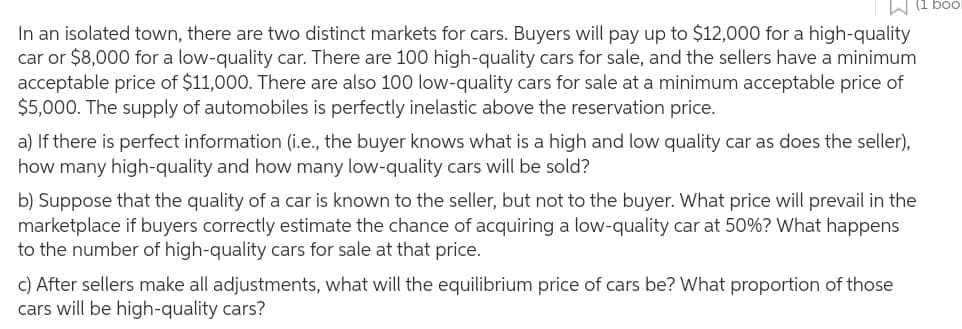1 boo In an isolated town, there are two distinct markets for cars. Buyers will pay up to $12,000 for a high-quality car or $8,000 for a low-quality car. There are 100 high-quality cars for sale, and the sellers have a minimum acceptable price of $11,000. There are also 100 low-quality cars for sale at a minimum acceptable price of $5,000. The supply of automobiles is perfectly inelastic above the reservation price. a) If there is perfect information (i.e., the buyer knows what is a high and low quality car as does the seller), how many high-quality and how many low-quality cars will be sold? b) Suppose that the quality of a car is known to the seller, but not to the buyer. What price will prevail in the marketplace if buyers correctly estimate the chance of acquiring a low-quality car at 50%? What happens to the number of high-quality cars for sale at that price. c) After sellers make all adjustments, what will the equilibrium price of cars be? What proportion of those cars will be high-quality cars?
1 boo In an isolated town, there are two distinct markets for cars. Buyers will pay up to $12,000 for a high-quality car or $8,000 for a low-quality car. There are 100 high-quality cars for sale, and the sellers have a minimum acceptable price of $11,000. There are also 100 low-quality cars for sale at a minimum acceptable price of $5,000. The supply of automobiles is perfectly inelastic above the reservation price. a) If there is perfect information (i.e., the buyer knows what is a high and low quality car as does the seller), how many high-quality and how many low-quality cars will be sold? b) Suppose that the quality of a car is known to the seller, but not to the buyer. What price will prevail in the marketplace if buyers correctly estimate the chance of acquiring a low-quality car at 50%? What happens to the number of high-quality cars for sale at that price. c) After sellers make all adjustments, what will the equilibrium price of cars be? What proportion of those cars will be high-quality cars?
Managerial Economics: A Problem Solving Approach
5th Edition
ISBN:9781337106665
Author:Luke M. Froeb, Brian T. McCann, Michael R. Ward, Mike Shor
Publisher:Luke M. Froeb, Brian T. McCann, Michael R. Ward, Mike Shor
Chapter17: Making Decisions With Uncertainty
Section: Chapter Questions
Problem 10MC: You are considering entry into a market in which there is currently only one producer (incumbent)....
Related questions
Question

Transcribed Image Text:In an isolated town, there are two distinct markets for cars. Buyers will pay up to $12,000 for a high-quality
car or $8,000 for a low-quality car. There are 100 high-quality cars for sale, and the sellers have a minimum
acceptable price of $11,000. There are also 100 low-quality cars for sale at a minimum acceptable price of
$5,000. The supply of automobiles is perfectly inelastic above the reservation price.
a) If there is perfect information (i.e., the buyer knows what is a high and low quality car as does the seller),
how many high-quality and how many low-quality cars will be sold?
b) Suppose that the quality of a car is known to the seller, but not to the buyer. What price will prevail in the
marketplace if buyers correctly estimate the chance acquiring a low-quality car at 50% ? What happens
to the number of high-quality cars for sale at that price.
c) After sellers make all adjustments, what will the equilibrium price of cars be? What proportion of those
cars will be high-quality cars?
Expert Solution
This question has been solved!
Explore an expertly crafted, step-by-step solution for a thorough understanding of key concepts.
Step by step
Solved in 2 steps

Knowledge Booster
Learn more about
Need a deep-dive on the concept behind this application? Look no further. Learn more about this topic, economics and related others by exploring similar questions and additional content below.Recommended textbooks for you

Managerial Economics: A Problem Solving Approach
Economics
ISBN:
9781337106665
Author:
Luke M. Froeb, Brian T. McCann, Michael R. Ward, Mike Shor
Publisher:
Cengage Learning

Managerial Economics: A Problem Solving Approach
Economics
ISBN:
9781337106665
Author:
Luke M. Froeb, Brian T. McCann, Michael R. Ward, Mike Shor
Publisher:
Cengage Learning